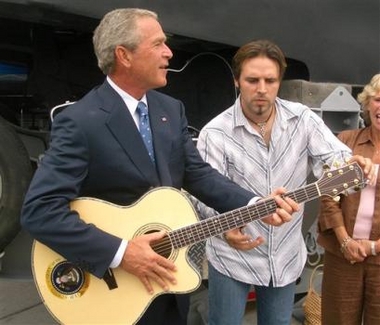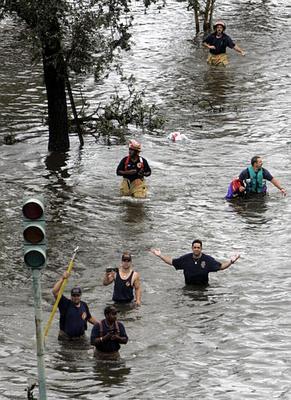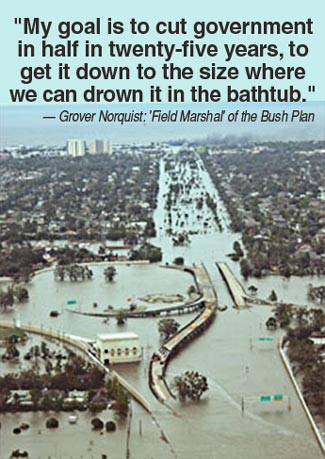I haven’t posted yet about the aftermath of Hurricane Katrina, but I’ve been following the story (like pretty much everyone in the US fortunate enough not to be more-directly involved). Probably inevitably, I’ve been drawn to stories that attempt to draw a connection between Bush’s leadership (or lack thereof) and the extent of the chaos.
I have mixed feelings about these stories. There’s a side of me that wants very much to make sure that Bush’s shortcomings as president are exposed. But there’s another side of me that says hey, wait a second. People are dying. Tens of thousands of people, probably, have died or are going to die in the coming days as a result of this disaster. We have more-immediate concerns right now than Bush’s shortcomings.
Besides that, no one, not even a Bush-hater like me, can blame the guy for this. Hurricanes happen, and they pre-date the Bush administration. New Orleans was built on sinking ground in one of the wettest parts of the world — again, before Bush came along. Give the political knife-sharpening a rest. There will be time for assigning whatever blame rightfully belongs to Bush later.
That second side of me has a good point, which is one reason why I haven’t posted about this until now. But despite that, I want to mention some stories I’ve been reading about this, and talk a little about how I view the various criticisms.
There are four main prongs of the blame-Bush-for-Katrina’s-misery argument:
Prong the first: Bush’s contributions to climate change. By fighting a delaying action against any effective response to global warming, Bush has contributed to a situation that scientific consensus now agrees is creating more-severe hurricanes. Logically, this argument is weak. It might be correct; but there’s no proof at this point. Super-strong hurricanes like this may be becoming more common as a result of the policies Bush has been supporting, but it’s too early to say that with any degree of certainty. Yeah, I think Bush’s head-in-the-sand approach to global warming is stupid, and evil, but as a practical matter of today’s politics, he’s safe from being challenged on this issue (which, indeed, is probably why he feels safe serving the interests of his big-energy buddies, even if it means dooming millions of our descendents to climate-related misery — those descendents don’t have a vote today).
Anyway, making this argument against Bush just makes it easy for Bush supporters to mock us for being reflexive haters. I’m giving this argument a pass for now.
Prong the second: Poor disaster prep. Bush’s fingerprints are all over the weakening of FEMA and the reassignment of its responsibilities to the now-revealed-to-be-woefully-inadequate Dept. of Homeland Security. He has slashed the budget for levee upgrades, and supported wetland draining and development. All of these actions have served to make this disaster much worse than it otherwise would have been.
People have been screaming about this for years, and now they’ve been proven right. I think this is the strongest argument against Bush, logically. No, he wasn’t responsible for causing the hurricane or choosing a stupid spot to build a city. But his policies have made the aftermath of the storm worse than it needed to be.
Still, I think Bush has a good chance of having most of this mud slide off him. As with the inadequate attention given to al Qaeda prior to 9/11, and the pre-war intelligence doctoring on Iraq, the mere fact that we have smoking-gun documentation of his mistakes doesn’t mean he’ll be held accountable for them. He’s really, really good at escaping blame in these situations. Freakishly good, you could say.
Prong the third: Misplaced priorities. Through the launching of an ill-advised war of choice that has siphoned off manpower and dollars, Bush has severely constrained our disaster-recovery options. Yeah, the Iraq war was stupid, and we’re now paying a price for having a quarter or more of the Louisiana and Mississippi National Guard troops in Iraq. And the fact that the federal coffers have been drained by $5 billion/month for the last two and a half years to pay for the war certainly hasn’t helped.
Whether this argument carries weight with a particular person basically turns on whether that person supports the war or not. Given that a majority of the US now believes the war was a mistake, I think this is potentially a pretty damaging argument against Bush. Symbolically, at least, the fact that we now have a domestic example of inadequate preparation and bungled aftermath, with dramatic TV visuals for months to come, is going to make a lot of people connect those dots in their heads. I call first dibs on the use of “quagmire” (metaphorical in the case of Iraq, literal in the case of Katrina’s aftermath) as a linking device in the resulting story.
Prong the fourth: Poor leadership. Through his weak and ineffectual initial response, Bush has contributed to the chaos we’ve seen in the early stages of the hurricane-recovery effort.
This argument doesn’t carry as much weight with me as some of the other ones. Yeah, he could have done a better job of cheerleading and comforting the country and marshalling our efforts on behalf of the victims. But I’m not sure that his failure to do so has made much of a real-world difference.
The fact that Bush doesn’t do real-time leadership very well isn’t something I really hold against him personally. He’s just not that kind of guy. He’s not that smart (book-smart, I mean). He doesn’t really know much, and when he’s caught flat-footed by events it shows. He needs a few days for Karl and the gang to figure out what response will put him in the best light, and then they have to write the speech, and set up the visuals, and all that takes time.
But this is the prong that I think could damage him the most in the public eye, because of the memories it evokes of his initial response to 9/11. Will he be able to pull off another bullhorn-speech-at-Ground-Zero moment to supplant the public’s image of him as an incompetent boob? I don’t know. I’m sure he’ll try.
And note this, too: It’s not so much that Bush was slow to react after the hurricane. It was that he was slow to react before it hit, when it was clear that it was headed for New Orleans, and when a little presidential goosing of the relevant agencies might well have made a difference that could have saved thousands of lives.
Okay; enough of me. Here are the links I promised:
And finally, I want to steal these two images from David Corn. Both were taken on Tuesday, August 30:


Pretty much tells the story, doesn’t it?




